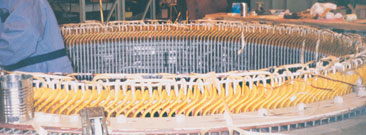Dip & Bake Coil Construction
Quality CMI Dip & Bake insulation systems keep your form-wound AC motors running longer and more reliably. The CMI Dip & Bake insulation rated Class F or higher is specially designed to protect AC form-wound coils.
Dip & Bake insulation is ideal for drip-proof and TEFC motors and generators originally wound with Class A, B or F insulation systems, and for voltages up to 7,200. Semiconducting paint is used on the slots of all coils 6,600 volts and above to provide corona suppression. The Dip & Bake system has proven highly reliable in industrial, utility and continuous-process applications, and has been used and improved by CMI on both new and rewound motors and generators.
The CMI Dip & Bake Construction Process
Turn-and-strand insulation is selected so that each insulation system design will provide maximum motor up-time. Coils are wound using rectangular copper conductors insulated with a minimum of Quad enamel coatings whenever possible. Some applications may require the use of single or double glass-over-film combinations or mica turn-taped construction.
Conductors are pressure bonded and sized to align the turns to provide a highly flexible but mechanically stable coil loop. The coils are then shaped to precise dimensions in a coil spreader.

Coil leads are then insulated using an acrylic sleeving or multiple layers of tape depending on the voltage or motor application. All sleeving has a Class F temperature rating and a 7,000-volt dielectric rating for maximum protection.
Coil ground insulation may consist entirely of micamat tapes or a combination of tapes and slot wrappers followed by Dacron glass or glass armor tapes. Multiple layers of these tapes and wrappers are used depending on voltage, motor application or specific customer requirements.
After the coils are insulated, they are given a Dip & Bake in polyester insulating resin for extra sealing protection.
Dip & Bake testing assures the highest quality rewinds form-wound replacement coils using Dip & Bake insulation systems are built to strict quality standards and are required to pass numerous quality checks.
Single coils are surge tested at values well above IEEE standards. The completed coils can also be tested to the IEEE high-potential standard for new motors of twice the rated voltage plus 1,000 volts.